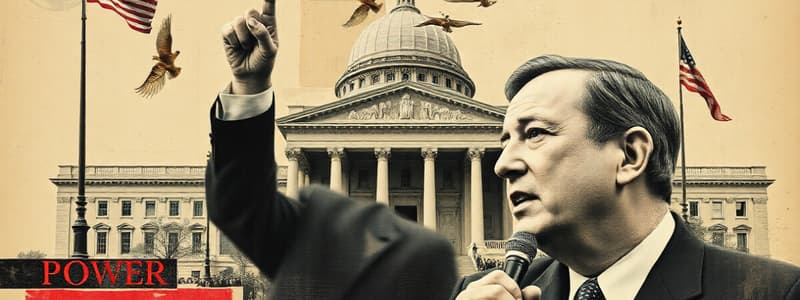Podcast
Questions and Answers
What is the primary characteristic of political power as described?
What is the primary characteristic of political power as described?
- The legal privilege of using force. (correct)
- The skill to negotiate agreements.
- The capacity to manipulate objects.
- The ability to create wealth.
What example is given to illustrate the concept of political power?
What example is given to illustrate the concept of political power?
- The collection of taxes. (correct)
- The imposition of fines for speeding.
- Voluntary donations to charities.
- Contracts in business transactions.
How is political power characterized in terms of its nature?
How is political power characterized in terms of its nature?
- Beneficial and constructive.
- Enticing and persuasive.
- Encroaching and often invisible. (correct)
- Strictly regulatory with no force involved.
Which statement reflects the caution regarding political powerseekers?
Which statement reflects the caution regarding political powerseekers?
What conclusion did Jefferson reach about trust in governance?
What conclusion did Jefferson reach about trust in governance?
What is the main distinction made between political power and influence?
What is the main distinction made between political power and influence?
What does Samuel Adams suggest about human passions and political power?
What does Samuel Adams suggest about human passions and political power?
How is political power described in relation to its effect on individuals?
How is political power described in relation to its effect on individuals?
What did historian Bernard Bailyn observe about the early study of power?
What did historian Bernard Bailyn observe about the early study of power?
What is mentioned as a common behavior observed in politicians over time?
What is mentioned as a common behavior observed in politicians over time?
Which term does Thomas Paine use to describe the desire for control within his pamphlet?
Which term does Thomas Paine use to describe the desire for control within his pamphlet?
What physiological reaction is compared to the effects of cocaine?
What physiological reaction is compared to the effects of cocaine?
What is suggested about the feelings of powerseekers over time?
What is suggested about the feelings of powerseekers over time?
What phenomenon is illustrated through examples like a child tying a tin can to a dog's tail?
What phenomenon is illustrated through examples like a child tying a tin can to a dog's tail?
How do corporations exert influence compared to governments according to the content?
How do corporations exert influence compared to governments according to the content?
Flashcards
Political Power
Political Power
The legal right to use force against individuals even if they haven't committed any harm, such as levying taxes.
Political Power Seeker
Political Power Seeker
A person seeking the legal privilege to use force to control others. They often desire to use guns, prisons, and chains to impose their will.
Political Power
Political Power
The ability to use force against people, regardless of their actions. It's distinct from skills or talents, and is always used to influence behavior.
Government's Unique Privilege
Government's Unique Privilege
Signup and view all the flashcards
The Problem with Power
The Problem with Power
Signup and view all the flashcards
Emotional Patriotism
Emotional Patriotism
Signup and view all the flashcards
Influence
Influence
Signup and view all the flashcards
Lust of Power
Lust of Power
Signup and view all the flashcards
Power Corrupts
Power Corrupts
Signup and view all the flashcards
Power as a Biological Booster
Power as a Biological Booster
Signup and view all the flashcards
Political Power as Addiction
Political Power as Addiction
Signup and view all the flashcards
Amoral Power Seekers
Amoral Power Seekers
Signup and view all the flashcards
Scientific Study of Power
Scientific Study of Power
Signup and view all the flashcards
Psychopolitcal Analysis
Psychopolitcal Analysis
Signup and view all the flashcards
Study Notes
Political Power
- Political power is the legal privilege to use force on those who haven't harmed anyone.
- Taxes are a common example, as they threaten citizens with force (arrest) for not complying with government demands.
- Only government is allowed this type of force; private institutions cannot compel people to buy goods or obey commands.
- Power seekers want the legal use of force to get their way, often with good intentions.
- This power is inherently corrupting. History shows an acceptance and abuse of power throughout leadership, despite good intentions.
Nature of Political Power
- Political power isn't a skill or talent; it's the use of force against individuals.
- Power is disguised, often in the background—the "mailed fist in the velvet glove."
- Power is often intoxicating and liable to abuse.
- Power can corrupt a good person into a tyrant.
Power, Addiction, and Corruption
- Political power potentially has an addictive effect, linked to a primal, "boosting" mechanism for survival (like the mammoth example).
- Powerseekers may lose their moral compass, becoming amoral to achieve that feeling.
- It's similar to a drug addiction, substituting for natural body chemicals.
- Historical examples show repeated misuse and corrupting effects of power.
Comparisons to Cocaine
- Power experiences a rush, like cocaine's effects.
- Cocaine's effects are linked to artificial substitution of body chemicals, perhaps akin to political power's effect.
Historical Observation on Power
- Founders' studies concluded power is intoxicating and corrupting.
- Extensive corruption in government is observed historically.
- Historical figures like William Pitt commented on the corrupting nature of power.
Influence vs. Power
- Influence differs from power.
- Private entities (corporations) can influence but cannot use force (guns, prisons) like governments do.
Peace Officers vs. Police Officers
- Peace officers uphold fundamental laws (enforcing civilization) and protect citizens, combating encroachment and fraud.
- Police officers enforce what politicians demand (potentially breaking peace).
Quotes about Political Power
- Many quotes from various historical figures (La Rochefoucauld, Voltaire, Churchill, etc.) highlight the corrupting, intoxicating nature of power, and the risk of its misuse.
- Quotes from figures like Plato, Hitler, and Emerson illustrate various perspectives on power and politics.
Additional Notes
-
Power-worship can lead to the belief that current trends continue without questioning the status quo.
-
History shows humans make the same mistakes repeatedly when power is involved.
Studying That Suits You
Use AI to generate personalized quizzes and flashcards to suit your learning preferences.



